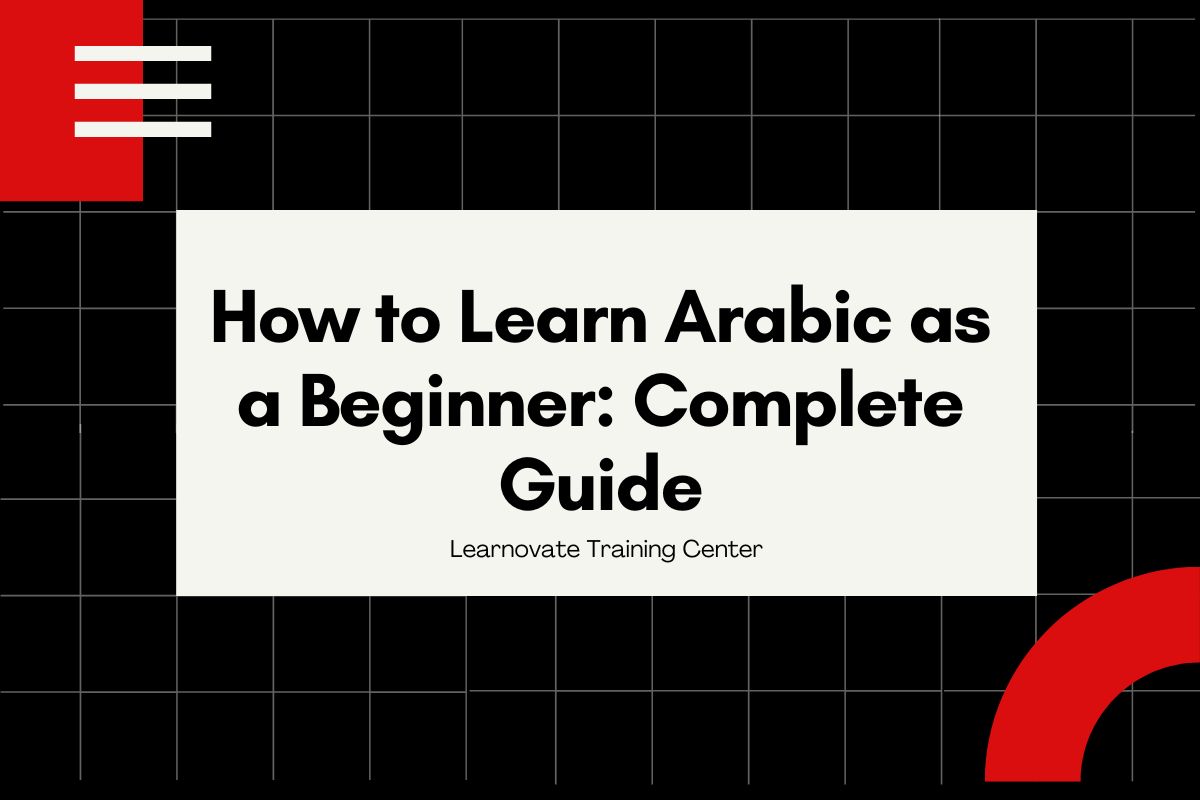Learning Arabic can be exciting and a bit scary. You might want to travel, improve your job chances, or explore a new language. Knowing how to learn Arabic well is key. This article will give you tips and strategies for beginners.
Arabic is a very important language worldwide. Learning it fast can open many doors. Get ready to explore a world full of different cultures and languages!
Key Takeaways
- Learning Arabic opens doors to new cultures and experiences.
- Setting clear language goals is key for effective learning.
- Using a variety of resources helps in learning Arabic.
- Consistent practice is needed to get good at Arabic.
- Talking with native speakers boosts your learning.
- Understanding basic grammar is key to mastering the language.
- Tracking your progress keeps you motivated and on track.
The Importance of Learning Arabic
Learning Arabic opens many doors. It’s the fifth most spoken language worldwide. It’s important in international relations, business, and cultural exchanges.
Knowing Arabic makes your life richer. It also helps in global communication.
Global Significance of the Arabic Language
Arabic is important in many areas. It shapes talks in politics, economics, and culture. Knowing Arabic is key for good communication.
Learning Arabic can make you a leader in international work. You’ll be a big help in any team.
Career Opportunities Through Arabic Proficiency
Knowing Arabic can boost your career. Jobs in translation, diplomacy, and business look for Arabic speakers. Being fluent in Arabic makes you stand out.
It helps in negotiations, cross-cultural deals, and partnerships. Arabic skills are very valuable in today’s job market.
How to Learn Arabic: Setting Your Language Goals
Setting clear language goals is key to learning Arabic. Define what fluency means to you. Decide on your desired level of proficiency and set a timeline. This creates a clear path for your learning.
Using the SMART criteria helps. It stands for Specific, Measurable, Achievable, Relevant, and Time-bound. This makes setting your goals more effective.
Defining Your Arabic Learning Objectives
First, think about what you want to achieve in Arabic. Do you want to talk, read, or write in Arabic? Here’s how to set your goals:
- Find out why you want to learn Arabic.
- Check your current level and where you aim to be.
- Make a timeline with reachable goals.
- Choose resources and methods that fit your learning style.
By following these steps, you lay a strong foundation for learning Arabic. Your goals will stay focused and relevant. This keeps you motivated and on track.
Choosing the Right Arabic Learning Resources
Finding good Arabic learning resources can really help you get better at the language. There are many choices out there, for every kind of learner. Mix different tools into your study plan to learn more and have fun.
Types of Resources Available
Arabic learning resources come in many shapes. Here are some popular ones:
- Textbooks: Traditional books offer structured lessons and exercises.
- Online Courses: Interactive classes let you study Arabic online whenever you want.
- Mobile Apps: Apps like Duolingo or Rosetta Stone help you learn on the move.
- Language Exchange Platforms: Websites that connect you with native speakers for real-time practice.
Finding Reputable Arabic Learning Websites and Books
Finding quality resources is key for learning well. Look for websites and books with good reviews and are well-known in education. Some top picks include:
- Alif Baa: A Foundation Course in Arabic
- ArabicPod101: An engaging online learning platform
- BBC Languages: Offers free resources for language learners
- Italki: A platform to connect with professional tutors
Arabic Language Courses: An Overview
Looking to learn Arabic? There are many courses to choose from. Each one fits different schedules and learning styles. This makes it easy to find the perfect one for you.
Finding Courses That Fit Your Schedule
First, think about your busy life. It’s key to pick a course that works for you. Here are some things to consider:
- Course intensity: Choose a program that matches your weekly time commitment.
- Duration: Look for courses that fit your schedule, from short to long-term.
- Teaching methods: Decide if you like structured classes or a more relaxed learning style.
Online vs. In-Person Classes
Technology has made online learning popular. Online courses offer flexible schedules and learning at your own pace. But, in-person classes provide direct interaction with teachers and peers. Each has its benefits:
- Online Courses: They offer flexible timing and access to many resources. You can also learn from teachers worldwide.
- In-Person Classes: They provide face-to-face interaction and support from peers. You get immediate feedback from teachers.
Study Arabic Online: The Benefits
Learning Arabic online has many benefits. It lets you study when and where you want. This makes learning fit your life and what you like.
Flexibility in Learning
Online Arabic classes let you learn at your own speed. This is great for keeping up with other things you need to do. You can pick the best times for lessons and focus on what you find interesting.
You can also go back to lessons and practice materials. This helps you understand Arabic better.
Access to a Global Community
Learning Arabic online connects you with people from all over. You meet learners and native speakers. This makes learning more fun and helps you feel more confident.
It also lets you see different cultures and ways of speaking. This makes you appreciate Arabic more.
Best Way to Learn Arabic: Tips for Beginners
Learning Arabic as a beginner means practicing every day. It’s also important to get used to the language. Simple tips can help you learn faster. Try to study every day and use Arabic in real life.
Consistent Practice and Exposure
Staying active with Arabic is key. Here are some tips:
- Make time each day for vocabulary practice.
- Listen to Arabic podcasts or music every day.
- Write short sentences to improve your grammar and vocabulary.
Engaging with Native Speakers
Talking to native speakers is very helpful. Here are some ideas:
- Join language exchange programs to improve your speaking.
- Go to cultural events or clubs for Arabic-speaking people.
- Find conversation partners online for practice.
Mastering Arabic: Focus on Listening and Speaking Skills
To get good at Arabic, you need to work on listening and speaking. These skills help you understand better and feel more confident. Learning to listen well and practice speaking can really help you improve.
Effective Listening Techniques
Using the right listening methods can make you understand spoken Arabic better. Here are some tips:
- Listen actively by paying full attention and avoiding distractions.
- Watch Arabic media like podcasts, TV shows, and movies to get used to different voices.
- Listen to native speakers talking to improve your ability to recognize words and phrases.
Speaking Practice Opportunities
Speaking out loud helps you get better at Arabic. Look for chances to practice:
- Join conversation clubs to talk with others who are learning or are native speakers.
- Get a tutor for one-on-one help and feedback.
- Take part in language exchange programs to talk with Arabic speakers online or locally.
Boosting Your Vocabulary: Key Strategies
Learning Arabic fast means growing your vocabulary. Using smart strategies can boost your word recall and use. Flashcards and contextual learning are top methods. They help you remember and use words in real life.
Using Flashcards and Apps
Flashcards are great for learning new words. They help you remember through repetition. Many apps offer virtual flashcards for all skill levels.
- Anki
- Quizlet
- Memrise
These apps use spaced repetition to focus on tricky words. This makes studying more efficient and fun.
Contextual Learning Approaches
Learning in context is also key. Reading, watching, and talking in Arabic exposes you to new words. Try these tips:
- Read Arabic books or articles that interest you.
- Watch Arabic films or listen to Arabic music.
- Engage in conversations with native speakers.
These activities add new words and improve your understanding. This mix helps you use Arabic words every day.
Arabic Grammar: Understanding the Basics
Learning Arabic grammar is key to mastering the language. Knowing common rules helps you build sentences right. This makes your thoughts clear in Arabic.
Common Grammar Rules to Know
Learning the basics of Arabic grammar is easier. Here are some important rules:
- Noun-Adjective Agreement: Adjectives must match nouns in gender, number, and definiteness.
- Verb Conjugation: Arabic verbs change with tense, mood, and subject details.
- Sentence Structure: Arabic sentences usually follow Verb-Subject-Object order, unlike English.
- Use of Definiteness: Definite articles are key in Arabic, changing how nouns are used.
Resources for Learning Arabic Grammar
Many resources can help you learn Arabic grammar. Using them can deepen your understanding:
- Grammar Books: “Al-Kitaab” is a detailed guide to Arabic grammar.
- Online Courses: Sites like Coursera and Udemy have grammar-focused courses.
- Websites: Arabic-grammar.com offers lessons and exercises on Arabic grammar.
- Mobile Apps: Apps like Duolingo and Rosetta Stone include grammar exercises.
Cultural Insights: Learning Arabic Beyond the Language
Learning Arabic is more than just words. It’s about understanding the cultures where Arabic is spoken. This includes traditions, history, and social ways of life. Knowing this makes learning Arabic more meaningful.
Understanding Arabic-Speaking Cultures
Exploring Arabic cultures helps you learn the language better. The Middle East and North Africa have their own ways of speaking Arabic. Here are some key points:
- Customs and Traditions: Knowing local customs helps you understand conversations better.
- Historical Influences: Learning about history helps you understand how the language has changed.
- Art and Literature: Arabic art and literature can make you appreciate the language more.
The Role of Culture in Language Learning
Learning Arabic without knowing its cultures is incomplete. Getting involved in cultural activities helps you connect with the language. Here’s how:
- Participation in Cultural Events: Going to events lets you see Arabic in action.
- Consumption of Media: Watching Arabic movies, listening to Arabic music, and reading Arabic books shows you culture.
- Interacting with Native Speakers: Talking to people who speak Arabic gives you real-life language lessons.
Tracking Your Progress in Arabic Language Proficiency
Keeping track of your Arabic skills is key to your learning journey. It shows you how well you’re doing and what you need to work on. This boosts your motivation and makes learning fun.
Setting Milestones and Celebrating Achievements
Setting clear goals helps you stay on track. Aim to learn a certain number of words each week or have a longer conversation. Celebrating your wins keeps you motivated to keep going.
- Identify short-term milestones to build confidence.
- Recognize significant accomplishments, no matter how small.
- Share your achievements with fellow learners for added encouragement.
Using Language Proficiency Tests
Tests show how good you are at Arabic. Tools like the ACTFL or CEFR are great for checking your level. They tell you what you’re good at and what you need to work on.
- Research available language proficiency tests that suit your level.
- Prepare using resources that mimic the format of the tests.
- Use test results to adjust your learning strategy and goals.
Conclusion
Starting your Arabic learning journey? Remember, setting clear goals is key. Knowing what you want to achieve keeps you motivated. Whether you want to talk like a native or learn Arabic grammar, having a plan is important.
Choosing the right learning tools is important too. There are many options, like online courses and books. Find what works best for you and your life. Using different materials helps you learn more and understand Arabic culture better.
Staying on track is vital. Practice regularly and watch real Arabic content. Think about the tips and tools from this article. Use them to move forward in your Arabic learning. Learning Arabic opens up new worlds for you.













